Trofimena Ruocco Deufemia
'People travel to come here': Mena Remembers Growing Up in Covent Garden
An interview conducted by Oline Eaton
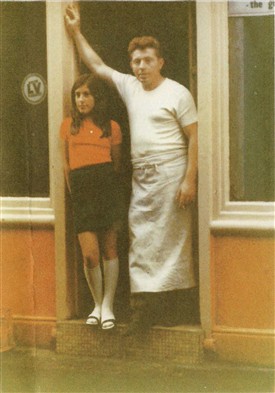
Mena outside Frank's Cafe
Trofimena Ruocco Deufemia
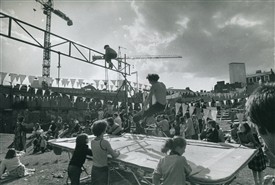
Covent Garden festival in the community garden
Covent Garden Community Association
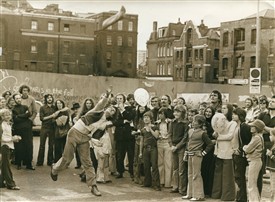
'Throw the Wellie' a popular Covent Garden festival game, c1974
Covent Garden Community Association
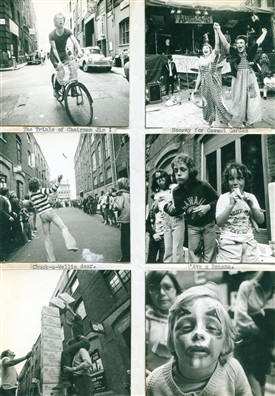
Various images from the Covent Garden festival. 1978
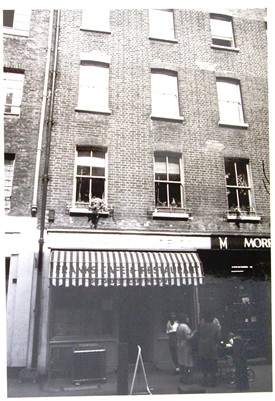
Frank's Cafe in the 1980
Children remember different things, often tucking away the details, images, and memories that adults overlook. Mena was too young to participate in the campaign to save Covent Garden, but she remembers the neighbourhood: the fruit and veg, the parked cars and playing in the streets, the carnivals and her father’s Anglo-Italian café. Hers isn’t the story of saving the neighbourhood, but rather a record of living in it and growing with it.
We’re sitting in the Seven Dials Club one mid-May evening when Mena tells me that her father, a former policeman, came to the UK from Italy with a work permit enabling him to be employed in the kitchens. As she remembers, he started out ‘washing dishes at first, then by the time four years had passed, he had the money and he got the chance to take on Frank’s Café and he jumped at it.’ That is how her father became a restaurateur, and how Mena and her family came to live in Covent Garden when she was eight years old. In 1968, the family moved from Islington to be nearer to the family business, located at 52 Neal Street, and she has lived in the neighbourhood since. ‘I keep thinking I might move out and then I don’t,’ she says. ‘I’m just so used to it… You can literally go to the theatre and then walk home!’
When I ask how the area has changed in the last forty years, Mena remarks that ‘Now it’s posh, it’s tourists, just tourists… and it’s quite noisy.’ The Friday night street noise drifts in through a nearby open window, as if to confirm this. Of the old Covent Garden, she recalls: ‘I was young but I just remember it, it was a lovely, lovely atmosphere… the people working and the hustle and bustle and the café was really busy, so busy.’
The Covent Garden of Mena’s memory is dramatically different from the commercialised, stylized Covent Garden of today. ‘Basically there were just, like, fruit and veg scattered everywhere and obviously that attracted mice and rats,’ she recalls, but ‘my memory was of literally playing outside in the streets. We use to play ball. We used to play hide and seek and, basically, we just played on the street. It was safe… I just remember it being really lovely and really friendly.’ Though it’s crammed with foot traffic today, the Covent Garden of Mena’s youth had room to spare. ‘The cars were parked there on Neal Street, which is impossible now. Literally, they were parked!’ she says with a laugh.
During Mena’s childhood, the old Covent Garden was changing into the new, and concerned citizens launched the Covent Garden Community Association (CCGA) to stop the proposed redevelopment of the area. Apart from supplying food and drink free of charge to some people, Mena’s family wasn’t active in the campaign, and she surmises that this was because of the language barrier and the long hours of work. ‘Not that they didn’t involve us,’ she quickly adds. ‘It’s because it was difficult sometimes,’ waking up at 5 a.m. and running a busy restaurant all day. It didn’t leave much time for her parents to get involved. But the family lived and worked in Covent Garden, and so the campaign inevitably intersects with some of Mena’s childhood memories. She remembers that her father and Jim Monahan were very good friends. She recalls the gardens that were lost in the redevelopment, describing them as ‘big, open spaces’ that, even though she was a child, struck her as impermanent: ‘They were almost temporary. That was the feeling you got. They were temporary.’
Prior to our interview, a video was screened of the Covent Garden campaign, which included footage of the various neighbourhood festivals. When I ask Mena if the festivals were as fun as they looked, her face lights up. ‘They were fantastic! They were amazing! It was just singing and dancing. People enjoying themselves.’ She laughs and slyly reveals, ‘He was actually quite strict, my dad, so I think I managed to persuade him to let me go! I thought it was just a festival. It was to save Covent Garden, which I didn’t know at the time.’
Saving Covent Garden Market was the centrepiece of the CCGA’s campaign and Mena’s family was, in fact, dependent on the market, which supplied her father’s restaurant. For Frank’s Café—an eight table, 36-seat establishment on Neal Street between Shaftsbury and Shorts Gardens— the market was key, because Mena’s father ‘was able to get stuff at a good price… even, I dare say, cheap.’ He was then able to pass those savings on to the customers through ‘big portions.’ This is what Frank’s Café would be known for: good food, good prices, good portions. And it’s cottage pie and Spaghetti Bolognese, the two customer favourites that, Mena says, ‘sum my place up.’
In the 1970s, the Greater London Council (GLC) began implementing its redevelopment scheme with the relocation of the Covent Garden Market to Nine Elms, a move that radically altered the neighbourhood’s dynamic. Mena remembers the uncertainty of the time: ‘It was a bit of a worry… not knowing what was going to happen because suddenly there was nothing… it just became a quiet place, empty for a little while, till it started to find its feet.’ Mena’s parents had considered moving to the new market at Nine Elms and opening a café there, but they decided against it, choosing to commit to Covent Garden and stay on Neal Street. Luckily, though the neighbourhood was changing, its occupants still frequented Frank’s. ‘It was all these new people,’ Mena recalls. ‘It worked out in the end and there was a time actually when, in the 70s and 80s, we were very busy.’
When Mena’s father died in 1988, she took over the café for her mother. ‘I did it for 20 years… it was really hard... it was very hard, but we got there in the end.’’ She ran the business until 2008, when things slowed down and the café was forced to close. ‘Once we had September 11th, the American people stopped coming, and you don’t realise how many you have until they stop coming.’ Mena reflects, philosophically: ‘It came to an end. You know, you have to accept that things like that happen.’
Though things change and things end, Covent Garden remains. For those who remember it as it was, the atmosphere is different, but it is still lively, still bustling and busy. As our interview draws to a close, I ask Mena about Covent Garden today and she mentions the Piazza. ‘You just walk through there and there’s, like, so many different nationalities and people, so now and again it’s actually quite nice to do that. In the world, you know, people travel to come here… right down the road.’ Her tone is one of wonder, surprise almost, that people from all over the world travel great distances to be in the place where she grew up, the neighbourhood where she has always lived.
This interview was conducted as part of the Lottery Heritage Fund project, 'Gentlemen We've Had Enough: the Story of the Battle to Save Covent Garden'. On 10th May 2013 King's College London students, supported by Westminster Archives, the Covent Garden Community Association, and the Centre for Life-Writing Research at King's College London, interviewed Covent Garden residents about their memories of the area. Students' accounts of their interviews have been added to this Covent Garden Memories website. For more information please see: http://www.kcl.ac.uk/artshums/ahri/centres/lifewriting/gentlemen.aspx.'